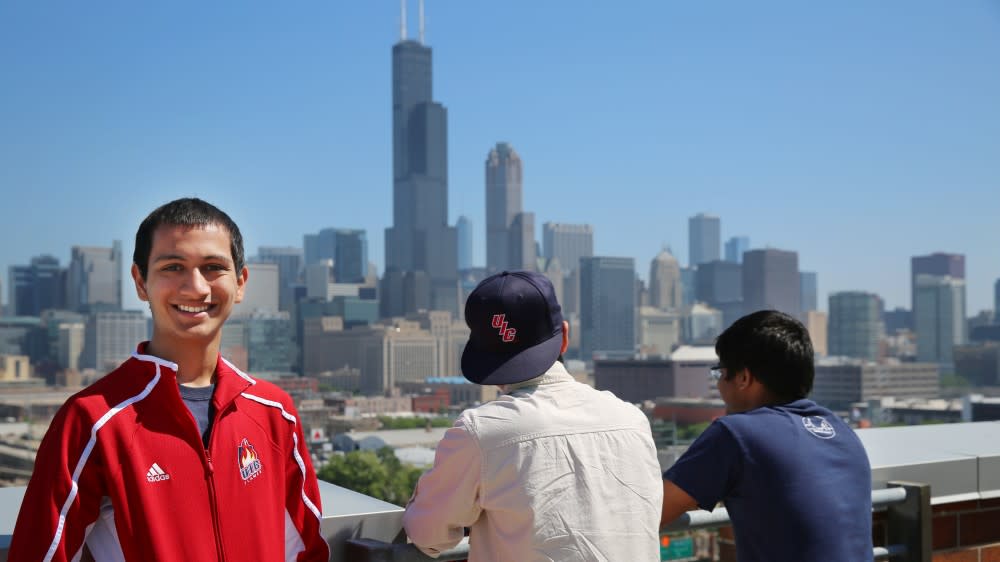International students (like you) tend to choose colleges in big cities because of everything that an urban university has to offer. From career opportunities to international cuisine, major US cities provide many chances to try out new things and expand your horizons.
Of course, arriving as an international student at your new urban university may come with a bit of culture shock. At first, adjusting to college can seem overwhelming but the connections, friendships, and internship opportunities are worth the effort. Colleges in cities can provide you with an educational experience that extends far beyond the classroom.
Start by choosing a US university that suits you best and then seek out people and opportunities that will make your overseas education experience truly rewarding. This guide to colleges in major US cities will help you get a better sense of college student life on a city campus.
All About College Student Life at an Urban University
An urban university is located in or near major US cities. Colleges in big cities tend to have small classes, with an average of 15 to 25 students. They give you access to all the resources of a big city, with the one-on-one attention of a smaller campus.
International students choose to study at colleges in big cities because the businesses and cultural centers nearby are full of opportunity. For example, Adelphi University’s main campus is less than an hour from New York City by train, and also has a secondary campus in the heart of the city. For students living on these campuses, there is always something new to explore. Finance majors can apply for an internship on Wall Street. Performing arts students can visit Broadway. Business students are close to hundreds of national and international corporations.
Additionally, student populations at urban universities tend to be diverse. At the University of Illinois Chicago, students speak more than 50 different languages. American University in Washington, DC, hosts students from more than 100 countries. Off campus, a rich culture surrounds colleges at big cities, like at American Collegiate, Los Angeles — the 8th-most diverse city in the United States.
Attending college in major US cities does not mean you have to give up outdoor activities. Miami, home of Florida International University, is surrounded by two national parks and has 800 parks within the city limits. At the University of Massachusetts Boston, students can sail and kayak on Boston Harbor.
Student clubs, field trips, and other organized events give you opportunities to explore or you can gather some friends and make your own adventure.
Tips for Adjusting to College in Major US Cities
Many international students wonder about the cost of living in US cities. While costs are often higher in cities compared to rural areas, colleges in big cities can still be affordable. For example, Cleveland, Ohio — home of Cleveland State University — has the 16th-lowest cost of living of any city in the United States. In more expensive areas, living on campus can help prevent you from overspending on housing. You might also cut costs by using public transportation rather than owning and maintaining a car.
Speaking of transportation, cities offer multiple transit options including trains, buses, and taxis to get around — many even provide special student discounts on fares. Your university may also be close to a major airport, making international travel more convenient. To get around on campus, you might choose to walk or ride a bicycle. Many major US cities have bike lanes designed to keep bicyclists safe on the road.
American cities are safer than you may imagine. In fact, Adelphi University is in the top 20% of the safest universities across America. Even so, there are actions you can take to make city living even safer:
Obey walk signals and traffic laws. Whether walking or driving, follow signs and traffic signals to avoid accidents.
Pay attention and trust your instincts. Be aware of your surroundings to spot safety hazards before they cause problems. If a place or person makes you feel uncomfortable, leave immediately.
Memorize emergency numbers. In the United States, the emergency phone number is 911. Make sure you know your address so you can tell emergency responders where to find you.
Avoid walking alone after dark. Walking with friends is safer (and a lot more fun).
When you explore off campus, you can learn about business, finance, art, and culture — and meet interesting people. Cities bring together people from diverse backgrounds and industries. You might even be able to find restaurants serving food from your home country.
The Benefits of Studying in Major US Cities
Studying at an urban campus brings you one step closer to major businesses and global employers. The University of Utah’s location in Salt Lake City, for example, enables students to network with local employers like Adobe, Chevron, and Goldman Sachs. This helps make the job process — like finding and applying for internships and interviewing — a lot easier. At UMass Boston, about 500 companies recruit on campus, resulting in nearly 2,000 students completing internships.
As an international student at a city campus, you will be connected to a network of alumni from many countries — which means you will be able to build a network of personal and professional connections that span the city and the world.
Colleges in Big Cities Are Full of Opportunity
If you want to live and study in a fast-paced environment full of opportunities, an urban university could be right for you. Adjusting to college life is easier when you are surrounded by other international students, small classes, and plenty of opportunities — and that is exactly what colleges in big cities can do for you.
Learn how Shorelight can make the transition to life on campus easy for international students >

